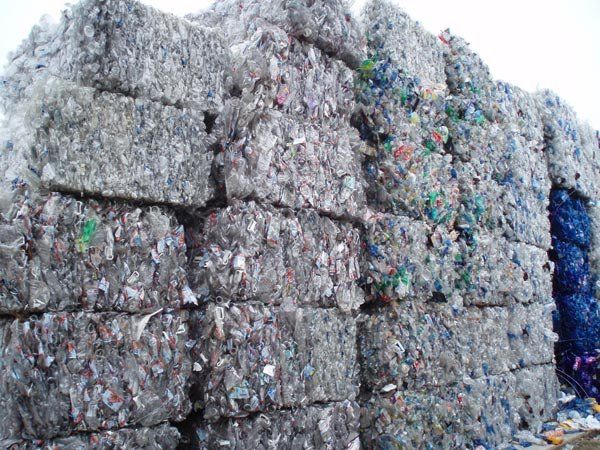
Plastics are a rapidly growing segment of municipal solid waste (MSW). While plastics are found in all major MSW categories, the containers and packaging category had the most plastic tonnage at over 14.5 million tons in 2018. This category includes bags, sacks and wraps; other packaging; polyethylene terephthalate (PET) bottles and jars; high-density polyethylene (HDPE) natural bottles; and other containers. Manufacturers also use plastic in durable goods, such as appliances, furniture, casings of lead-acid batteries and other products. EPA does not include plastics in transportation products, other than lead-acid batteries, in this analysis.
According to the Environmental Protection Agency, only 30% of plastic water bottles are recycled.
Myth: You should throw anything that you think might be recyclable into the recycling bin.
Is it OK to recycle that plastic container with a half-eaten salad in it? Or that old garden hose, or those batteries? You might think that it’s better than sending them straight to the landfill. But items that are nonrecyclable — or even just dirty — don’t magically transform when they get to the recycling facility.
So 20% of the processing capacity that is being used at a typical recycling facility is being used to process stuff that has to go to a landfill.
Myth: All plastic is recyclable.
When China passed the “National Sword” policy in 2018, banning the import of recycled consumer plastics along with other types of waste, it sent shockwaves through the recycling industry. The United States used to export most of its recycled plastic to China; suddenly, the industry was scrambling to handle hundreds of thousands of tons domestically.
In the first couple of months, lots of recycled plastic went to the landfills. Luckily, the market has since adapted, and new domestic facilities have popped up that are willing to accept and process plastic. That is — certain kinds of plastic.

Plastics are classified into numerical categories, or resin-identification codes, based on the materials of which they’re made. You can usually figure out which category an item falls into by looking for the classic ‘chasing arrows’ recycling symbol somewhere on its surface. The symbol will have a number in the middle. According to Keelig, the 1s and 2s are always recyclable. These include everyday items, like soda, Gatorade and water bottles, as well as jugs of laundry detergent, dish soap and milk. “That’s about 80% to 90% of the marketplace for plastics,” said Keelig. “So if we just recycled those items, you could do a lot of great things and accomplish a lot in terms of recycling.” However, “National Sword” posed a bigger problem for plastics in the 3 to 7 categories, which experience a much lower domestic demand.
Myth: Recycling begins and ends at the recycling bin.
how to recycle correctly is only the first step in becoming more waste conscious. We should also adjust our consumption patterns — like what we’re consuming and how much — before recycling even enters the picture.
“The reason we have problems in the waste and recycling system is because we generate so much waste. People need to be more mindful of what they’re generating and generate less.”
This means investing in reusable bags, containers, water bottles, drinking straws and kitchen towels, to name a few. Keeling also emphasized the importance of purchasing recycled goods, thereby boosting the recycling industry as a whole. Many paper, aluminum and plastic products are made out of recycled content.
How is Eswachh helping in Plastic Recycling
Eswachh is an End-To-End Waste management company, The Dry waste collected from households is segregated further into Plastic, Metal,Glass, Cardboard & Paper. The Plastic collected is handed over to the Plastic processor authorised to process the plastics. They further segregated the plastic into sub categories and process and recycle plastic.


